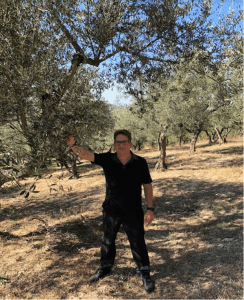Crafting Creative Solutions to Conflicts. Member Spotlight: Louie Spedaliere
Louie Spedaliere is a Harvard Law School, trained mediator taught by Professor’s Linda Singer, Michael Lewis and Frank Sander who is considered the father of (ADR) Alternative Dispute Resolution; Awarded a Bachelor of Laws with Honors, LL. B (Hons), at Nottingham Law School, Nottingham Trent University, England; Mediators Beyond Borders International Member; Currently teaching a professional development certificate program, accredited by the ADR Institute of Canada.
Personal Background

Louie began his story explaining his passion and interest in getting involved in his community “I was interested in getting involved in solving problems and advocating for social justice. In 2012 Louie became the Richmond Hill Provincial Liberal Association President, with a plan to improve education, health care and public services” Combined with an entrepreneurial spirit, and with a desire to preserve his family’s cultural heritage, Louie started organic farming extra virgin olive oil together with his brother Dominic originating from his grandparent’s olive groves located in Molise, Italy and importing this olive oil to Canada and USA in 2002. During his new endeavor in Europe, he began studying law at Nottingham Law School, Nottingham Trent University in England.
Career Development
During his years as a law student and legal intern he realized the importance of having a conflict resolution conversation to resolve disputes early before they escalate into a costly lawsuit. Louie’s alternative dispute resolution training and interests encouraged him to write his honors thesis on the subject of mediation titled: ‘The Benefits of Family Mediation as Compared to the Traditional Adversarial Approach’. Louie also studied Mediation at Harvard Law School in 2003 and in 2010 he began providing legal services and eventually started mediating family and workplace disputes as a mediator.
A Member of MBBI
“Together we will build a more peace-able world” is the slogan of peace of the organization, which was born as a response to what the founders recognized as the need to change the approach to conflict worldwide: “Aware of the necessary shift from the ‘powerful nations’ model to a ‘people centered’ peace building model.” On the other hand, MBBI provides various channels for those who want to be involved, such as professional development as continuous education, training programs, and webinars. In this sense, Mr. Spedaliere found interesting material for his students on our website. “I joined because of my interest in connecting with mediators globally to share, teach and learn best practice in the field of Alternative Dispute Resolution.”
Going Deeper into Mediation
Is mediation independent from law?
“I think they both can work hand in hand. Mediation is all about communicating better with the assistance of a trained neutral third-party verses dealing with just the legal issues alone with a decision maker; Mediation can allow parties to resolve disputes promptly, efficiently, inexpensively, voluntarily, confidentially and parties have control over the outcome; Parties narrow down issues and resolve matters while avoiding litigation and its high costs. Mutual agreements may further be incorporated into a judge’s court order with the assistance of lawyers”.
Is negotiation the same in law as in mediation?
“I think we must keep it separated; mediation is all about communicating human issues vs legal issues. Mediators help parties accept the fact that conflict is normal and encourage parties to have a discussion aimed at creatively reaching a mutual agreement that benefits both sides. Parties gain an understanding of the other side’s position by negotiating with the assistance of a trained and experienced neutral third-party mediator(s). In law, only the legal issues are of importance and deciding who’s right or wrong. In mediation empathy for somebody’s feelings are shared and we can understand and appreciate what’s important for both parties involved in a dispute. Human issues can be discussed separately from the legal issues in mediation. In mediation we discuss a wider range of issues and come up with creative solutions that would not be addressed in court.”
What are some of the essential keys a mediator should have?
“The mediator is like the referee, who controls the airtime and conversation, making sure both parties equally participate in the discussion. Mediators can break into a private caucus to address concerns when they observe body language for example if someone appears to look confused or notice that someone is not contributing equally. We can take them into a private room and tell them to let us know what’s important for them. Mediators can gain parties trust by keeping secrets from a private caucus discussion; Mediators should be active listeners that can paraphrase, recap and rephrase what has been discussed. Mediators take notes and observe the communication styles, show empathy, and make sure both parties have been listening and understand each other by asking questions; It’s not best practice for a mediator to make decisions alternatively the parties should make their own decisions; Parties should be encouraged to contribute as much as possible and come up with their own options and ideas. And finally, mediators can help find common ground and question the parties’ options and ideas to help narrow down ideas that work best for them.”
Louie’s mission is to connect with mediators globally to teach, share and continue learning best practice from other mediators while peace building.
Article by Francini Umanzor, MBBI Writer
